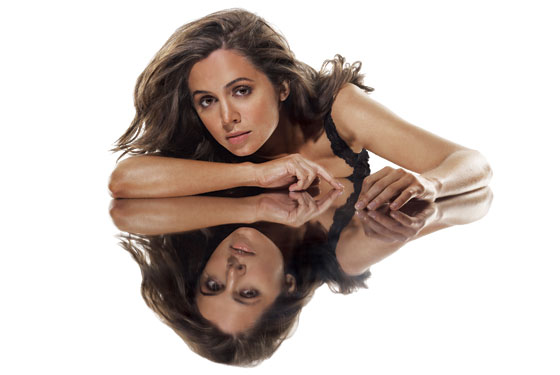
To judge from the buzz online, Joss Whedon’s new series, Dollhouse (Fox, Fridays at 9 p.m.), will be canceled any day now.
That’s a pretty sad state of affairs, given that the show—an eerie, unsettling sci-fi procedural about a mysterious organization that programs girls to suit any fantasy—hasn’t even aired (it debuts on February 13). But then, that’s the nature of scripted television these days: Hovering between TiVo and Hulu, threatened by a crumbling ad model, a new series must hit the pleasure buttons, hard, first time out, or be snuffed. And so the audience hardens its hearts with anticipatory cynicism, unwilling to fall for something strange that might soon disappear.
A decade ago, network TV, inspired by the freeing influence of cable, was overflowing with a crazy new race of auteurs: Whedon, Tom Fontana, Aaron Sorkin, Mitchell Hurwitz, Amy Sherman-Palladino, David E. Kelley, and J. J. Abrams. We seemed to be entering an age when original artists might blow the aesthetic horizons of TV wide open; but instead, the walls have narrowed, and today the few excellent network shows left are squeezed in by blocks of reality programming. Just one scripted genre has thrived, the cops/docs/lawyers procedural, from Law & Order to The Mentalist—a format that thrills TV executives, since the viewer can easily dip in and out of the show, allowing for easy syndication and overseas sales, unlike, say, a layered puzzle like Lost.
In this environment, Whedon introduces Dollhouse, a show that seems both a capitulation (it’s a procedural) and an innovation (it’s damned weird). His series have traditionally been hyperstylized projects, initially off-putting mash-ups of juvenile genres (teen soap meets goth, vampire noir, cowboy-flavored space opera) with sharp philosophical undercurrents that take a few episodes to emerge. And while Dollhouse, from its first episode, is recognizably Whedonesque, revolving around a superpowered heroine (the slinky-husky actress Eliza Dushku, who played a naughty slayer on Buffy the Vampire Slayer), it’s not simply a procedural, but several procedurals, nested like Russian dolls.
Whedon isn’t the first TV auteur to try an experimental spin on this genre: Tom Fontana flopped with The Jury, and J. J. Abrams’s Fringe is still limping along. Despite some clunky elements (the pilot, reworked from scratch after network notes, has a few puzzling sequences and off performances), Whedon’s attempt is far more provocative and promising than those earlier gambits, bubbling with Philip K. Dickish mind games. And yet the series may in fact be doomed, scheduled as it is in the notorious Friday-night death slot, the same place where Firefly met its fate.
Dollhouse begins with a scene of pure TV escapism: Echo, a hot girl in a motorcycle helmet, barely loses a playful road race. Then she shakes out her dark hair and shimmies onto the dance floor, cracking kinky jokes. Echo is wild, but she’s also vulnerable, capable of love; when her dance partner gives her a gold-heart necklace, she is convinced she’s met “the one.” Then she vanishes into an unmarked van to be deprogrammed.
Because Echo, we learn, is not actually the perfect girlfriend. Instead, she’s a perfect performer, a member of the Dollhouse, a fantasy-fulfilling corporation based in L.A. Like a reverse Pinocchio, Echo used to be a real girl, but now she has been recruited/coerced into an attractive clan of “Actives” or “Dolls”; after each mission, her brain is wiped clean with an electric sizzle (a process conducted by the smirky IT person of your worst nightmares).
Judging from the first episode, the Dollhouse itself is a juicy concept, reminiscent of Blade Runner and suggesting unnerving notions about memory and identity. Unfortunately, this procedural is encased in what appears to be a more conventional procedural: an FBI plot in which a hunky Mulder type hunts down the Dollhouse, shrugging off doubting superiors. But then, as the plot progresses, there’s an even odder twist, as Echo herself has essentially been hired to star in yet a third procedural, with a gruesome plot straight out of the Law & Order: Special Victims Unit playbook, where fetishized female bodies are traded like playing cards.
In this plot-within-the-plot, a Dollhouse client has his daughter kidnapped by Mexican thugs. To help him, the IT nerd splices a personality for Echo from a database of real people. She becomes a flawed but brilliant crisis negotiator whose icy diction (“I don’t have any hobbies,” she explains soberly), stiletto heels, and Sarah Palin bun suggest, as with the perfect girlfriend, less a cop than the TV fantasy of a cop.
Like Buffy, it seems, Echo is a real person who is also a metaphor: She’s a Frankenstein’s monster made of imitation selves, a flawed copy, which is what, the show implies, being a traumatized girl can feel like—the traces of former selves emerge, no matter how much you try to blot them out. “You can’t fight a ghost,” Echo insists at one point, and one imagines that Whedon plans his series to be about exactly that ghost: the one in the machine, both the body and the television screen.

Whedon has touched on these themes before. On Buffy, the satirical “Buffybot” was the docile fantasy blonde prickly Buffy could never be, and one episode featured a girlfriend programmed never to cry; on Firefly, a damaged young woman crackled with repressed memories. Like United States of Tara, another show with a splintered heroine, Dollhouse is ungainly at first glance, but full of rich themes: about false consciousness (that old feminist bugaboo, when a woman can’t tell if she wants something—implants, marriage—or has been brainwashed into it), the mystery of personality, the nature of memory in an age of digital copies.
But perhaps the strangest thing about Dollhouse is the way in which it seems to reflect Whedon’s anxieties about TV itself. Echo is as much like an actress as she is like a prostitute, a beautiful drone who behaves the way wealthy men think a woman should act. Whedon has always written about feminism, but as he’s progressed through Angel, Firefly, and Dollhouse, another theme has emerged: the question of how to live within a system that co-opts any attempt at rebellion.
Like many of Whedon’s loyal fans, I want him to be the auteur who cracks that code, who can again create a hit like Buffy that succeeds economically and also “invades people’s dreams.” But whatever happens to Dollhouse, whether it’s a success or just a great audition reel for Dushku, I have my doubts whether network TV can truly embrace weird. Whedon got it right when he launched his last great/odd project, the musical Dr. Horrible’s Sing-Along Blog, on the Internet—a project done on the cheap and launched right at his fans. If a renaissance is coming, it will have to happen online, where, with no middlemen, video might finally embrace the risk of the truly original. A passionate audience is waiting there, ready for something strange.